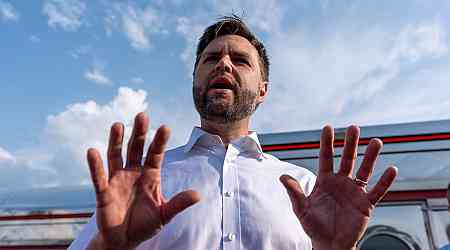
Six months after being ousted as the supervisor of Green Charter Township in rural western Michigan, Jim Chapman is sitting at the dining table in his son’s house, a haven from the dirty looks and death threats that continue even now. A self-described conservative Republican who was a police officer before entering local politics, Chapman says his downfall was negotiating to bring a $2.4 billion electric-vehicle-battery plant owned by a Chinese company to town, what he calls a once-in-a-generation opportunity to grow the local economy.
[time-brightcove not-tgx=”true”]The backlash was swift and withering. A Congressman launched an ad campaign ahead of his recall election, criticizing “local officials” for welcoming Gotion, the company building the plant. A recent caller left a voicemail threatening to target Chapman and “exercise my Second Amendment rights.” Another said he would call up his local militia. “This Neanderthal response has been the core of the problem,” says Chapman.
For a growing number of activists, he was just the start. Eight miles away, in a farm dotted with more than a dozen “No Gotion” placards styled like Trump campaign signs, Lori Brock, the farm’s owner, is coordinating anti-Gotion activists. Teri and Ormand Hook, local Michiganders, are working to spread their message across the state and country, while other GOP groups have taken the fight statewide with radio ads and slick campaign mailers blasted in local races. The impact could extend from Green Charter Township all the way to the White House. “We win Michigan for Trump, then most likely Trump is President of the United States,” says Pete Hoekstra, the chair of the Michigan Republican Party who is collaborating with local anti-Gotion campaigns. “A big reason for that would be what’s happening with China, and what’s happening with EVs.”

The fight for the future of the planet is embedded in this year’s U.S. presidential election in ways big and small, even as the phrase climate change is rarely used. Democrats are trumpeting the hundreds of billions of dollars now flowing to clean-tech projects; the party’s nominee is sure to echo President Joe Biden’s line that climate change is about jobs. Donald Trump and his supporters on the right have sought to turn clean energy into a stalking horse for Chinese dominance, a driver of rising energy costs, or a globalist ploy. Trump promises to cancel Biden’s vehicle-emissions regulations, unlock more oil drilling, and once again take the U.S. out of the Paris Agreement on climate change.
A growing cohort of climate advocates view the simmering anti-climate narrative with a concern bordering on panic. They have seen versions of the same fight playing out elsewhere, and it hasn’t gone well. In Europe, farmer protests and rising energy costs have put pressure on the European Union’s Green Deal. Climate advocates in Canada have watched with dismay as the nationwide carbon tax has been weaponized—and may play a significant role in coming elections. And in much of the Global South popular protests have created fears about following through on key reforms to fuel subsidies designed to address climate change.
Read More: It’s the World’s Biggest Election Year. Is Democracy Good for Climate Change?
The result, amid the hottest year on record, is a sort of climate retreat. French President Emmanuel Macron last year called for the E.U. to embrace a “regulatory pause” on new environmental rules. In March, the Biden Administration softened its rule that will require carmakers to produce more EVs. In June, New York Governor Kathy Hochul ditched a congestion-pricing plan designed to cut traffic and vehicle emissions by charging drivers in lower Manhattan. In the wake of record far-right wins in June’s European Union parliamentary elections, the bloc’s leaders are dialing back climate priorities.
At the same time, Biden’s green subsidies have begun to pay political dividends. Many industries support his climate measures. Even in some deep-red regions, new jobs making clean technologies like solar panels and electric vehicles are winning the backing of climate-skeptical Republicans. Asked about solar-panel manufacturing in her district last year, right-wing firebrand Marjorie Taylor Greene told Politico’s E&E News, “I think they’re fantastic … I support all kinds of energy.”
The coming months are crucial. If climate efforts become defined by right-wing narratives about China’s infiltrating U.S. schools, massive job losses, or rising energy costs, the transition away from fossil fuels could plateau just as it was getting started. “We are in a very fragile moment,” says Ali Zaidi, Biden’s national climate adviser. “The inflection point breaks in two very different directions.”
So climate advocates, researchers, and public officials are scrambling. Legislators are tweaking proposals to soften their impact on low-income people, and forward-thinking policymakers are devising creative ways to keep vulnerable communities from being left in the dust. Many other politicians are backtracking, making a counterintuitive bet that by taking a few steps back on climate policy they will help protect climate efforts by keeping right-wing politicians out of office. But slowing down carries grave risks too. The longer we take to cut emissions, the worse warming will be. To get through this moment, leaders will need to thread a needle.
On a cloudy day in the spring of 2023, the European Parliament in Brussels felt all but under siege. Across the city, farmers from around Europe had clogged the city’s streets with their tractors in protest against environmental regulations then under discussion targeting agriculture. “To be honest, I don’t know where we will end,” Pascal Canfin, a French Member of European Parliament whose party belongs to the centrist Renew Europe Group, told me in his office in Brussels as protests continued in the street. “This backlash is rather new.”
It’s only gotten worse. Since then, farmers have gathered to protest climate rules in cities across Europe—Madrid, Paris, and Rome, to name a few. In June, voters throughout the E.U. gave far-right parties record support in the bloc’s parliamentary elections. In France, the National Rally won the most votes; in Germany, the far-right AfD came in second after campaigning in part on opposition to climate policies. Meanwhile, the pan-European Green coalition sputtered, losing 18 seats. “In terms of being able to keep the green transition on course, I think this moment is pretty existential,” says Susi Dennison, a senior policy fellow at the European Council on Foreign Relations.
Not long ago this situation would have been hard to imagine. In 2019, in the midst of Greta Thunberg’s climate-change advocacy, which saw millions of young Europeans take to the streets, the bloc launched a Green Deal designed to eliminate the E.U.’s emissions by 2050. But then came a disruptive pandemic and Russia’s invasion of Ukraine, which raised energy costs. As these challenges persisted, many Europeans became unwilling to put up with new measures that cost them—even if the costs were relatively small. Autoworkers complained that the transition to EVs would disrupt jobs if it happened too fast. Farmers protested numerous rules that would require them to embrace new practices. And voters complained that it was the wrong time to tighten the bloc’s program that charges industry for emissions, effectively raising energy costs. Only a third of E.U. citizens said they were satisfied by the bloc’s response to climate change in a poll conducted earlier this year. Among Europeans who said they have trouble paying their bills most of the time, satisfaction with Europe’s climate program was even lower, at 24%.
Read More: Can ‘Green Market Makers’ Speed up Clean Tech?
The biggest political winner appears to have been the far right. For decades, nationalist forces had largely ignored climate change in favor of red meat issues like migration. Now the European right-wing has wrapped the costs of climate policy together with its long-standing critique of the E.U. to create a dark vision of a Europe where a global elite controls people’s daily lives. And a July report from NATO warned that Russia has engaged in an online disinformation campaign around Europe’s Green Deal designed to instigate climate backlash. “Climate has become part of identity politics here in Europe,” says Dennison. “It’s that sense of national populations losing control.”
Voters aren’t just punishing the E.U.; they’re also targeting their own country’s governments. In the Netherlands, the backlash contributed to the toppling of the longtime Prime Minister Mark Rutte as a new “farmer-citizen” movement emerged in opposition to his agriculture rules and quickly became the largest party in the Dutch senate. In Spain, the government’s water restrictions in response to persistent drought angered rural communities and helped fuel the rise of the right-wing Vox party. “We are concerned that there is a climate religion about which one can’t disagree,” said Vox leader Santiago Abascal in closely watched remarks explaining his climate position. The specter of right-wing populists has, in turn, already had consequences for climate policy. In a concession to protesters earlier this year, German Chancellor Olaf Scholz backed off cuts to subsidies for high-emitting agricultural vehicles and slowed the government’s phaseout of fuel subsidies for farmers. And a leaked priorities list from the leaders of European countries meant to guide E.U. leadership in Brussels barely mentions climate policy.
Meanwhile, in Canada, ahead of coming elections, the Conservative Party has seized on energy costs stemming from the country’s carbon tax. In Kenya, a plan to cut fuel subsidies has led to widespread protest. And then there’s Australia. The country’s long debate over carbon pricing that began more than a decade ago contributed to the downfall of two Prime Ministers and ushered in a right-wing leader who kept the country from doing anything substantial on the issue.

For all that, climate pushback is far from the only factor. In national elections in July, the French left defeated the country’s far right, which had hoped to undo much of the country’s climate agenda. In the U.K., former Prime Minister Rishi Sunak lost after trying to scale back his country’s approach to global warming. Worldwide, voters still care about climate change. In the E.U.’s 2023 poll of citizens across the bloc, 93% of E.U. citizens said they believe climate change is a serious problem. “It’s not that they deny the facts,” says Teresa Ribera, a Vice President of the Spanish government and Minister of Ecological Transition. “They lack confidence in institutions to shape the proper responses.”
If european politicians are paying the price for climate policies that penalize emissions, advocates hope the story will play out differently in the U.S., thanks largely to the Inflation Reduction Act (IRA). The 2022 law opted for carrots rather than sticks and will spend hundreds of billions of dollars in subsidies to transform the country’s energy system. In Michigan, manufacturing firms have announced nearly $12 billion in new clean-technology investments largely in electric-vehicle plants, according to nonprofit climate group E2. In the southeast, EV makers and solar manufacturers are racing to set up shop in what has colloquially become known as “the battery belt.” Georgia, another swing state, has seen more than $15 billion in clean-technology investment.
So far, Americans seem largely unmoved. A year after the IRA’s passage, nearly three-quarters of Americans had never heard of it, according to a Washington Post poll, and many tell other pollsters that Washington should prioritize the economy over climate change. Third Way, a center-left think tank that works on climate issues, found that support for congressional candidates declines when they say that climate change needs to be addressed immediately compared with those who say that “we cannot address climate change until inflation is under control.”
Extreme weather may make the most immediate case for addressing climate change, but it’s entirely possible that, in 2024, projections of two or more degrees of warming will matter less than the implications—real, perceived, or manufactured—of climate policy on pocketbook issues. In some congressional races, candidates have invoked Biden’s “Green New Deal”—a term he doesn’t use—to explain rising energy costs. Dark-money groups have purchased ads linking opposition to climate action with conservative causes. And Trump has homed in on electric vehicles, calling the shift to EVs a “transition to hell.” His official videos laying out his policy positions harp on the green transition, saying it has damaged American workers, led to an abandoning of U.S. natural resources, and ceded U.S. geopolitical might to China. At the Republican National Convention, railing on climate policy featured as an applause line. “They’ve spent trillions of dollars of things having to do with the Green New Scam,” Trump told the audience. “That has caused tremendous inflationary pressures.”
The November election will determine much about the endurance of the U.S. approach. If Trump wins, he would likely pull the U.S. out of the Paris Agreement and undo climate rules on everything from power plants to transportation. Plans laid out by Project 2025, a conservative group backed by former Trump staffers that has prepared a raft of policy proposals for a Trump presidency, would kneecap the agencies that regulate climate. And Trump would likely target the IRA, potentially pursuing a repeal if Republicans control both houses of Congress. Even if he couldn’t kill it, he might succeed at chipping away at it. Taken together, these moves would leave the U.S. far short of its international climate commitments when countries are meant to do more.
Read More: What Is Project 2025?
There is some evidence that undoing the IRA would face bipartisan resistance. Elected officials in the Southeast U.S., including many Trump-aligned Republicans, have come to embrace clean technologies as manufacturing has moved into their communities. It’s not unusual to see a Republican lawmaker at a groundbreaking for a solar-panel factory or an EV plant. Democrats hope—with good reason—that continued investment will broaden support for climate measures.
So the battle to make climate policy palatable could make all the difference, not just in the outcome of the election but in hardening American sentiment about the green transition. That fight for the future is now under way in full force in Michigan, a hub of the transition because of its long-standing auto industry. The state is benefiting from a wave of big clean-technology investments that promises to keep unemployment low, giving Democrats key talking points.
But in rural Michigan, where two EV-battery plants are planned each at a cost of billions of dollars, the conversation sounds completely different. Residents have been inundated with mail campaigns and ads from right-wing activists and organizers decrying the plants. Representative John Moolenaar, a Republican who represents western Michigan in Congress, spent more than $60,000 of federal dollars on a campaign that included an ad claiming that the battery maker “does the bidding of the Chinese Communist Party.” And a number of groups with limited paper trails have popped up to accentuate the issue: Standup Michigan, the Michigan-China Economic and Security Review Group, the Committee to Clean Up Mecosta County, and the EV Taxpayer Task Force.
Michigan is an early example of the small battles that will collectively determine whether the energy transition endures—not only in the U.S. but anywhere. In her 2020 book Short Circuiting Policy, political scientist Leah Stokes writes about an early wave of clean-energy laws in predominantly red states—including Texas and Arizona—triggering a backlash from local industry that deepened climate-change denial and made further climate policy increasingly difficult there.
This time, at least, some climate advocates see the challenge coming, and are scrambling to meet it.
Three hours’ drive away from Green Charter Township, on the other side of Michigan, a group of executives from auto-parts manufacturers gathered in the conference room of a Detroit skyscraper overlooking a bustling downtown, now on the upswing after two decades of downturn driven by automation and outsourcing. Sitting at the head of the table, Jonathan Smith, who left a policy job in D.C. to help his native Michigan through the energy transition, jumped into his plan to ensure that the upswing continues.
The state-funded office he is shepherding, known as the Community & Worker Economic Transition Office, will send “SWAT” teams to communities with pending plant closures, helping them find funding and job retraining programs. It will identify at-risk suppliers in the automotive industry and bring them opportunities to diversify their business. And it will provide technical assistance to local governments trying to navigate the transition. “The shift from a manufacturing economy to a knowledge economy, the Great Recession and the restructuring of the auto industry, those were things that we did not have a ton of opportunity to anticipate,” he told the executives. “This time is very different; this could be a really powerful way for us to get out ahead of some of the economic change that’s coming.”
Understanding past transitions offers important insight into the challenges of this one. Joseph Majkut, who heads the energy and climate change program at the Center for Strategic and International Studies, says he worries the future of climate policy could mirror how trade policy has evolved over the past three decades. Once a matter of near-universal orthodoxy, free trade has become a bogeyman across political parties. At a country level, we know that trade increases economic prosperity. But most people live rooted in communities, and free-trade policy has undoubtedly left many communities behind even as politicians have promised support that never came. Climate policy that helps the world avoid the worst effects of warming is also a net good for everyone. But that may not be enough to win over communities that suffer in the transition.

And the echoes abound. For the past 15 years, officials have assumed the economic upside of addressing climate change would seal the deal. But climate advocates are increasingly coming to grips with the reality that climate policy can also bring economic challenges and dislocation, and they need to address that.
Michigan’s economic transition office is one example, and its work reflects research on the on-the-ground challenges policymakers need to address. Drawing on lessons from climate policy across the globe, World Bank researchers last year identified several factors that determine successful societal buy-in for climate policy. Officials should weave climate measures into a broader growth and development agenda, researchers say. Economic side effects need to be managed. And all of this needs to be well communicated. The World Bank cites everything from the rollout of a climate-friendly waste-management system in Mexico to facilitating industrial efficiency in Japan as case studies of climate policies that thread the needle.
Now, the thinking needs to scale, and the communications challenge is a good place to start. In the U.S., whole ecosystems have built up around the idea that Americans will vote for new jobs. But many Americans will rightly ask whether those promised new jobs come at the expense of existing ones. In Europe, a consensus has grown that explaining climate policy solely for the purpose of reducing emissions is no longer sufficient. “We in the climate movement have to be quite clever,” says Laurence Tubiana, the head of the European Climate Foundation. “We have to be very conscious of where people are.”
Read More: The Selfish Case for Climate Justice
And, above all, the economics need to actually help people on the ground. Some of those efforts will be led out of capitals. In Canada, the government has begun to revamp a program that helps homeowners renovate in a climate-friendly way to focus more closely on low-income Canadians; a rebate for low- and middle-income families has been rebranded to emphasize that the money is coming from the carbon tax. “If you are asking people to sacrifice and sacrifice, that’s probably not the way to actually get the majority of people to support the work that you’re doing,” says Jonathan Wilkinson, the country’s Energy and Natural Resources Minister. In Europe, the E.U. has created a social climate fund with a €65 billion budget to dole out money to places left vulnerable by the transition. The Inflation Reduction Act, too, contains a dizzying number of programs and incentives to help vulnerable communities. Project developers get better tax breaks for building in communities whose economies might suffer in the transition and the law provides incentives for job-training programs, to name a few.
But to make it work requires local efforts too. To the communities, companies, and individuals that need many of these programs, accessing them can feel daunting. Smith notes that the U.S. has no shortage of job-training programs. It lacks the people in the real world connecting the dots.
He and his team have their work cut out for them. To many, the promise of jobs doesn’t make up for the prospect of an energy transition that would transform the fabric of the local community, even if for better. At a rally in the town of Marshall, Mich., where Ford is building a more than $2 billion EV-battery plant, I met Barry Wayne Adams, who carried a sign reading blah blah blah jobs. The jobs message carries little weight for people fearful of the coming change, he told me. He says he is concerned about the influence of China in the community and the local environmental effects of a new manufacturing plant. “Whenever they come out with any kind of public messaging, it’s ‘We’re so excited about the once-in-a-lifetime opportunity to bring jobs,’” says Adams. “They never address any of the issues that matter to us.”
The biggest challenge in avoiding a climate backlash in the U.S., though, may be getting climate advocates to admit that something isn’t working. Not everyone is eager to do so. When I floated early inklings of this story to some, I received a mixed response. Some echoed my concerns, arguing that we’re slow-walking into a disaster. Others discouraged me, arguing that bringing attention to climate backlash risks fanning the flames. But there’s another way to think about it: pointing out the flame gives us a chance to stamp it out before it’s too late.
—With reporting by Julia Zorthian/New York
TIME receives support for climate coverage from the Outrider Foundation. TIME is solely responsible for all content





























